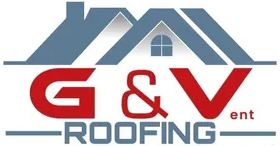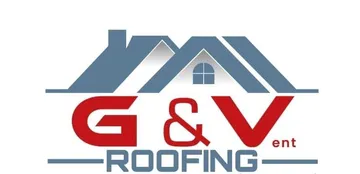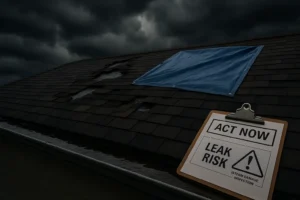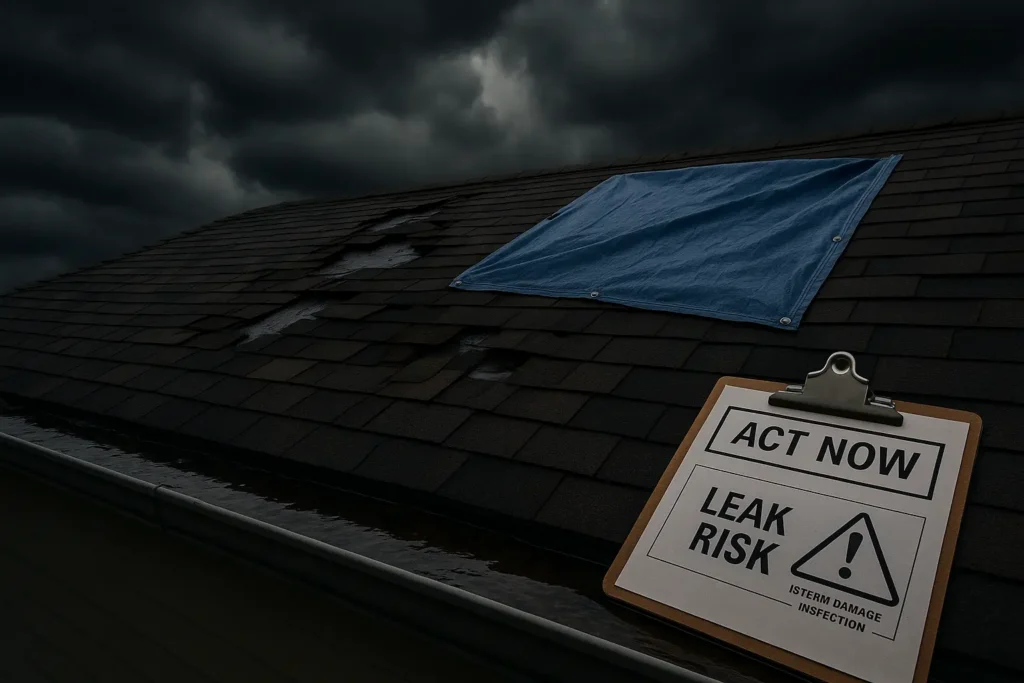
Storm roof repair addresses damage caused by extreme weather events like windstorms, hail, and heavy rain. Unlike routine roof maintenance, it involves emergency fixes, moisture control, and structural integrity restoration.
Storm roof repair matters because delayed action leads to moisture intrusion, insulation saturation, and structural decay. Quick action helps prevent mold growth, attic damage, and home insurance claim denials.
How Storms Damage Roofs Differently
Different storms leave different roof damage patterns:
Storm Type | Common Roof Damage | Requires Immediate Repair? |
Hailstorm | Dented shingles, granule loss, punctures | ✅ Yes |
Windstorm | Wind uplift, missing shingles, flashings | ✅ Yes |
Heavy rain | Leaks, water ingress, flashing issues | ✅ Yes |
Tree fall | Puncture wounds, structural breaks, sagging | ✅ Yes |
Storm-related damage is often invisible at first glance, especially beneath roof shingles or within the roof decking.
Example: A small crack in flashing can let water seep under shingles, causing roof deck warping within weeks.
Next: How can you tell your roof needs emergency repair after a storm?
Signs You Need Immediate Storm Roof Repair
Roof damage isn’t always obvious from the ground. But ignoring early symptoms leads to costly repairs and insurance claim issues.
Key Signs of Post-Storm Roof Repair Damage
Use this damage detection checklist after any storm:
✅ Missing or curled shingles
✅ Granule loss around downspouts
✅ Cracked tiles or displaced flashing
✅ Ceiling stains or water marks indoors
✅ Attic inspection reveals soft decking
✅ Chimney flashing separated from roof
✅ Mold or mildew smell in insulation
Tip: A roof storm inspection should happen within 48 hours post-storm. Roofing contractors use drones or direct inspection for soft decking and hidden leaks.
What Homeowners Often Miss
- Granular loss from shingles looks like normal wear but signals hail impact
- Roof sagging is a major sign of moisture trapped in the decking
- Attic ventilation blocked by storm debris can lead to heat buildup and shingle warping
Next: What kind of damage from storms makes immediate repair non-negotiable?
Types of Damage That Require Storm Roof Repair
Each storm brings a unique threat to your roof. Post-storm inspections must identify the type of impact to plan the right roof restoration strategy.
Main Categories of Storm Roof Damage
- Wind Damage
- Causes shingle uplift, flashing separation, and gutter detachment
- Weakens structural integrity over time
- Hail Damage
- Leaves dents, punctures, and bruising on shingles
- Leads to exposed underlayment and roof leaks
- Tree Impact
- Direct puncture or collapse of roofing materials
- Can compromise rafters and roof support systems
- Rain Damage
- Soaks underlayment
- Causes water ingress, attic flooding, and ceiling collapse
Example: One homeowner ignored a storm puncture from a fallen branch. Within 10 days, roof mold and rafter cracks appeared.
Next: What actually happens when storm damage goes untreated?
What Happens If You Delay Storm Roof Repair?
Delaying repairs leads to progressive damage, higher costs, and potential claim denials.
Consequences of Postponing Roof Repair
Risk Factor | Damage Outcome |
Hidden moisture | Mold growth, fungus development |
Trapped water in decking | Structural rot, insulation saturation |
Insurance delay | Denied claims, reduced payout |
Minor leak neglect | Major water seepage and ceiling collapse |
Pest attraction | Rodents and insects invade weakened structures |
Fact: Mold starts forming within 24–48 hours in damp conditions, especially if saturated insulation is left untreated.
Even small issues, like a missing shingle, can result in roof deck warping during the next rain.
Next: How fast do you need to act to align with your insurance policy?
How Insurance Affects Storm Roof Repair Timing
Insurance policies have strict timelines and documentation requirements. Fast action and accurate documentation protect your financial recovery.
Time Limits and Claims Process
- Claim window: Usually 30–60 days after the storm event
- Documentation required:
- Dated photos of damage
- Repair invoices
- Roofing inspection reports
- Common Denial Reasons:
- Late reporting
- Incomplete paperwork
- Policy exclusions for specific storm types
Step | What to Do |
Step 1: Contact insurer | Request claim form, understand deductible |
Step 2: Call the contractor | Schedule an inspection and get a repair estimate |
Step 3: Submit documents | Include all repair invoices and reports |
Tip: An insurance adjuster may not see minor damage. A roofing contractor’s report adds credibility.
Next: Which contractors are legit, and who should you avoid?
Choosing a Contractor for Storm Roof Repair
After a storm, many storm-chasing contractors show up. Some are unlicensed and leave homes worse off.
How to Vet a Roofing Contractor
✅ Check local licenses and bonding
✅ Request GAF or manufacturer certifications
✅ Confirm insurance (liability + workers comp)
✅ Ask for repair timeline and detailed bid
✅ Review BBB rating and customer feedback
Red flag: Contractors asking for large upfront cash payments before inspection.
What to Include in Your Roofing Contract
- Scope of work (materials, timeline, cleanup)
- Payment structure (linked to project phases)
- Warranty terms (both labor and materials)
- Emergency tarp coverage if needed
Next: Can your roof be upgraded to reduce future storm damage?
Preventing Future Storm Roof Repairs
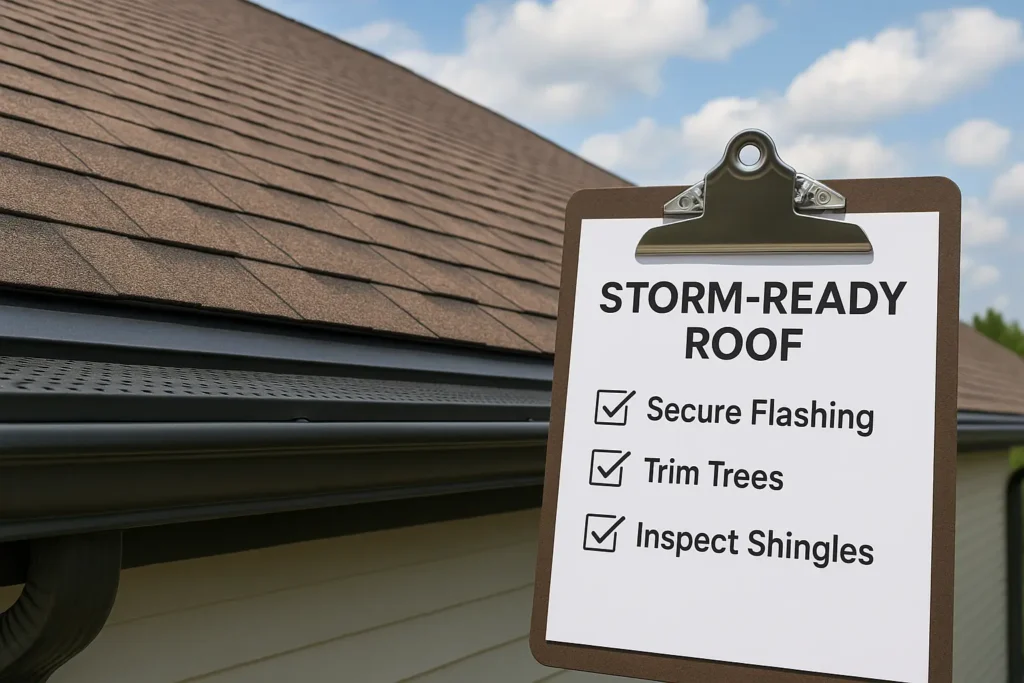
Modern materials and smart design reduce damage from future storms.
Best Practices for Storm-Resistant Roofing
Feature | Benefit |
Impact-resistant shingles | Reduce hail damage |
Storm straps | Anchor the roof to the frame in high winds |
Upgraded flashing | Prevents water ingress |
Synthetic underlayment | Adds a waterproof barrier |
Proper attic ventilation | Reduces moisture and heat buildup |
Pro tip: A roof slope design above 4:12 sheds water better and resists pooling.
Routine Inspection Checklist
- Inspect flashing, shingles, and ridge caps every 6 months
- Clean gutters to prevent water overflow
- Check attic for signs of moisture or pest intrusion
Next: How much will a storm roof repair actually cost?
Cost of Storm Roof Repair: What to Expect
Storm repair costs vary based on damage severity, roof type, and location.
Common Cost Factors
Factor | Cost Range (USD) |
Minor shingle repair | $200 – $500 |
Flashing replacement | $400 – $900 |
Full roof restoration | $6,000 – $15,000+ |
Emergency tarp & labor | $300 – $1,200 |
Hail impact repair | $700 – $3,000 |
Costs rise fast due to storm surcharges, labor shortages, and material spikes post-disaster.
Tip: Ask for a repair estimate breakdown including decking charges, fascia board fixes, and permit fees.
Next: What if you can’t get a roofer right away?
Temporary Fixes Before Storm Roof Repair
Temporary fixes can prevent damage from spreading until professionals arrive.
Emergency Roof Tarping 101
- Use heavy-duty roof tarp (preferably UV-rated)
- Secure with roof nails and fasteners
- Cover 2–3 feet past the damaged area
Use synthetic underlayment beneath the tarp for extra water resistance.
Temporary Leak Sealing
- Apply roof sealant in dry conditions only
- Use plastic sheeting for a short-term patch
- Never walk on a wet roof—ladder safety first
DIY fixes are temporary—call a certified storm roofer for a permanent solution.
Next: What do homeowners commonly ask about storm roof repair?
Case Studies: Real-Life Storm Roof Repair Outcomes
Case #1: Hail Damage, Timely Claim
A homeowner in Texas filed a claim 48 hours post-hailstorm
- Damage: Shingles bruised, flashing torn
- Result: Full roof replacement approved
- Timeline: 5-day install, $12,500 covered
Case #2: Tree Impact, Delayed Repair
A Florida resident ignored a punctured roof
- Result: Mold infestation, attic collapse
- Insurance refused payout due to claim delay
- Out-of-pocket cost: $18,000
Case #3: Flashing Failure, Fast Fix
- Flashing tore in a windstorm
- Emergency tarp applied the next day
- Full repair done in 48 hours
- Damage contained to $1,100 total
These outcomes prove timing, documentation, and the right contractor make a measurable difference.
Next: Don’t fall for these common myths that could cost you thousands.
Storm Roof Repair Myths Debunked
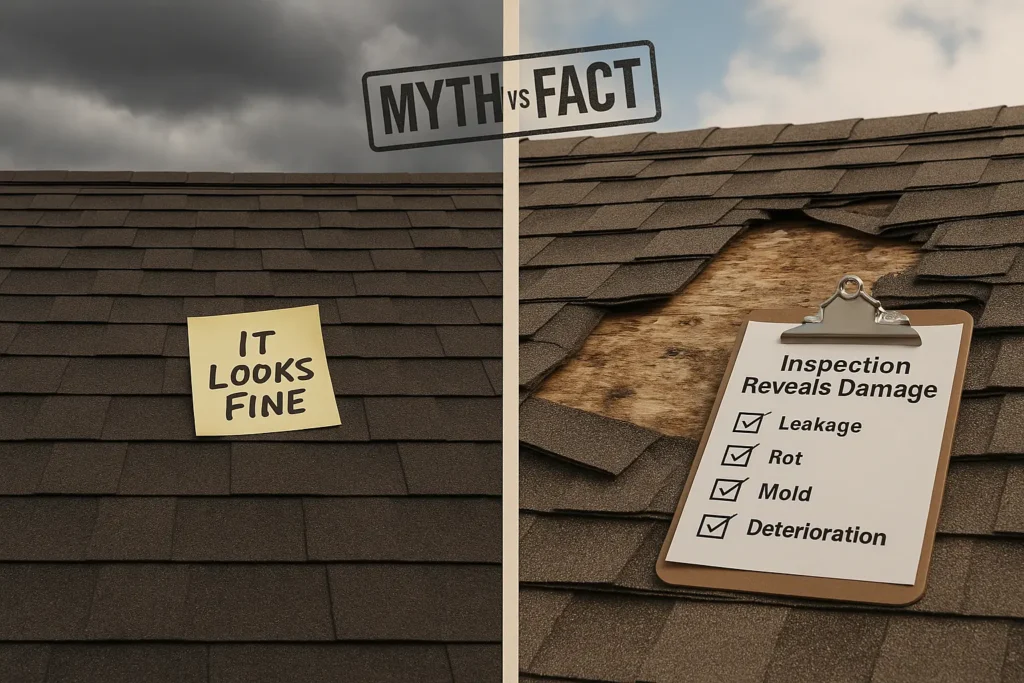
Myth: “My roof looks fine, no need to check.”
→ Truth: Damage often hides beneath shingles or decking.
Myth: “Insurance always pays for storm damage.”
→ Truth: Denials happen due to late reporting or excluded events.
Myth: “Any contractor can fix storm damage.”
→ Truth: Only storm repair specialists understand structural nuances and insurance code compliance.
Even a small leak ignored based on myths can escalate to roof neglect risks and long-term roof damage.
✅ FAQs About Storm Roof Repair
How long does storm roof repair take?
Emergency fixes take 1–2 days. Full restoration can take up to 10 days, depending on damage and weather.
Does insurance cover storm roof damage?
Most policies do. You must act within your claim window and submit proper documentation.
Should I replace or repair my roof?
If damage exceeds 30% of the surface or the roof age is 15+ years, replacement is usually more cost-effective.
What materials last longer in storms?
Metal roofs with high impact class ratings and architectural asphalt shingles resist hail and wind better.
Next: Real-life outcomes show how quick action changes everything.
Want More High-Quality Roofing Projects on Long Island?
G&V Roofing delivers trusted craftsmanship, reliable service, and local expertise that turns property owners into lifelong clients—all from one professional source.
Our Services:







Learn About:





🏡 Looking to Upgrade Your Roof or Protect Your Property Investment?
Whether you’re a homeowner looking for reliable roof solutions or a property manager seeking fast, expert repairs—G&V Roofing is your go-to Long Island partner for long-lasting protection and peace of mind.
 Follow Us for the Latest in Roofing Care, Property Protection & Home Improvement:
Follow Us for the Latest in Roofing Care, Property Protection & Home Improvement:






